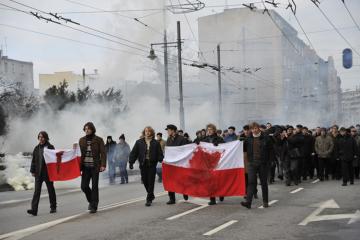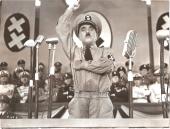`Black Thursday' recalls tragic time in Poland
Americans like to think that we and Ronald Reagan had something significant to do with the "victory over Communism" and the collapse of the Soviet empire in eastern Europe.
Poles know better. And no better demonstration of their historical truth has been rendered than in "Black Thursday" ("Czarny Czwartek"), director Antoni Krauze's devastating docudrama of the genesis of the workers' revolt that brought down Russia's puppet regime in Poland.
"Black Thursday" illuminates a seminal piece of the liberation story never told before on film, namely the first Polish shipyard protests of 1970 -- pre-Lech Walesa. Its protagonist is Bruno Drywa (Michal Kowalski), a sweet, low-key, devoted family man (and jokester) who is not politically involved at all. Bruno is solely concerned with his wife, Stefa (Marta Honzatko), and kids and providing a merry Polish Christmas for them at a time when the government has just announced huge milk and food price increases.
Bruno's shipyard town is not the metro-port Gdansk but nearby Gdynia, where the Nazis executed 12,000 patriots during the war. It was 90 percent destroyed by the Red Army in 1945. Twenty-five years later, labor strikes in Gdansk haven't yet spread there, and the Communist government hopes to contain the unrest by ordering all shipyard workers to return to their jobs.
Bruno -- like thousands of others -- obediently does so, unaware that the order is a calculated trap to provoke a confrontation between the workers and the military forces of hardline party leader Wladyslaw Gomulka. Informed that "Moscow is on the line," Gomulka dutifully takes the call and returns to tell his Politburocrats their "ideological compasses are misaligned -- you don't negotiate with counter-revolutionaries, you shoot them." Like Gadhafi and all other delusional 40-year dictators, false briefings lead him and his dull underlings to crack down on "liberalism."
The resulting arrests, beatings and massacre of strike leaders -- the chaotic terror and confusion -- produce incredulity in the face of brutality. The realism of the hospital scenes, the tear-gassing of funeral processions carrying victims on bloody red-and-white Polish flags -- all of it is tragically scripted, beautifully acted and memorably photographed, with actual documentary footage interspersed.
It is wrenching, and real. Like the determination of the Polish people themselves, whose martyred Gdynia workers were collectively commemorated in Andrzej Wajda's great film, "Man of Iron" (1981). Pittsburgh is full of their relatives and descendants.
But the power of "Black Thursday" derives from its specific commemoration and focus on a single man and his family -- no more or less heroic, or human, than any other. It is a threnody for all Holocausts, large and small: a must-see homage to those who led the resistance and paved the way.






